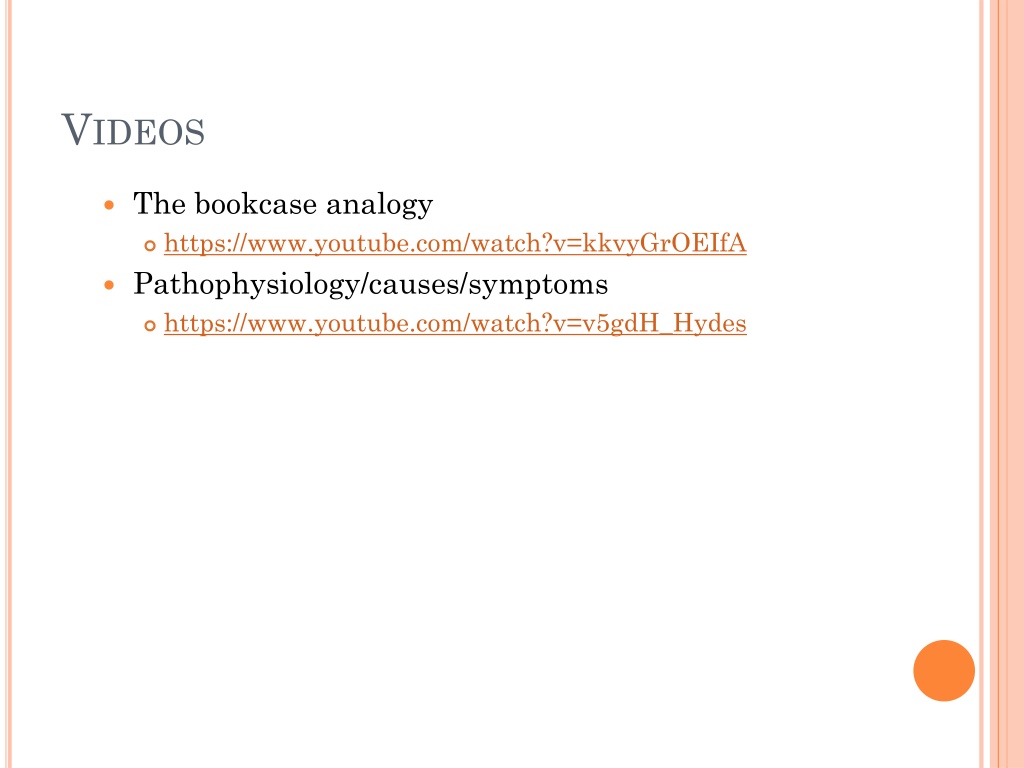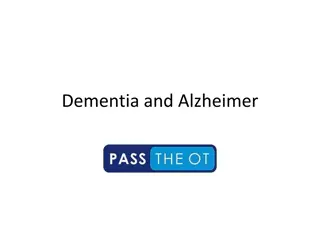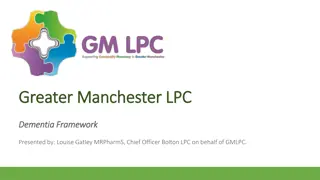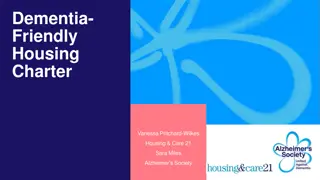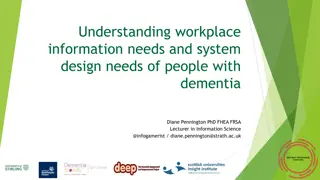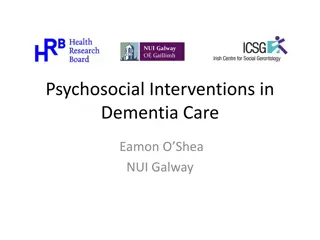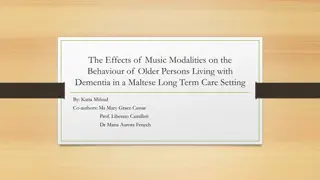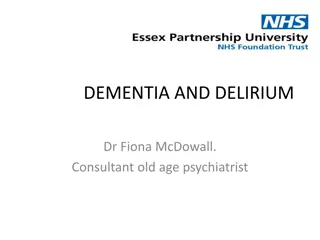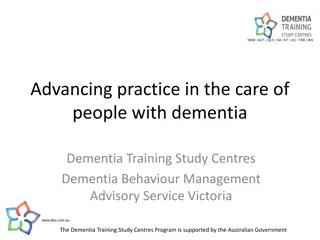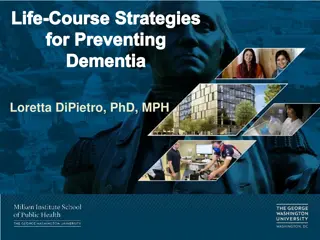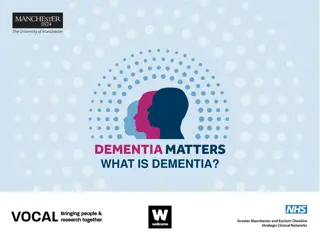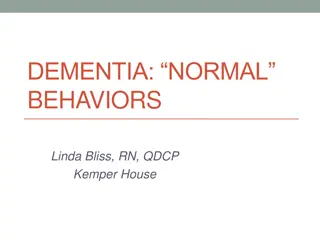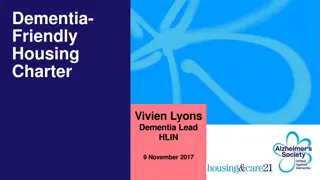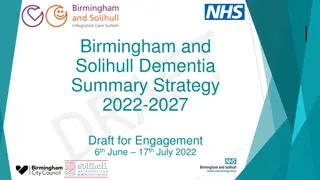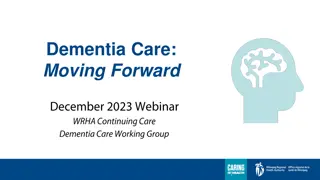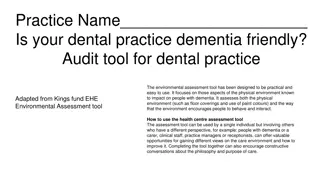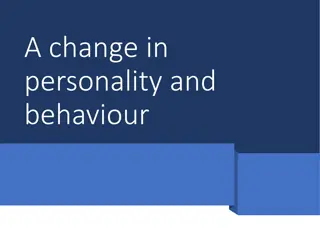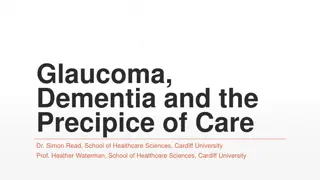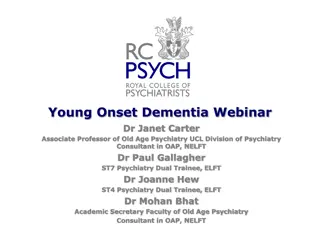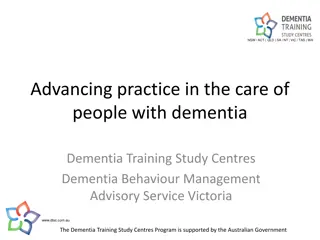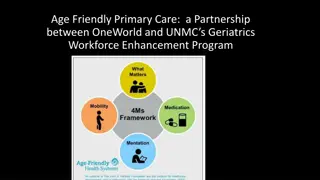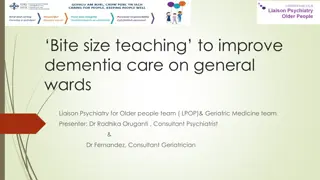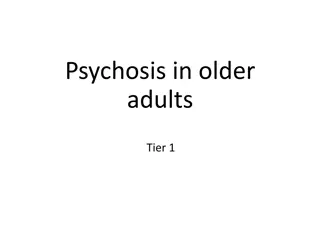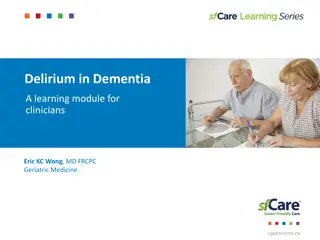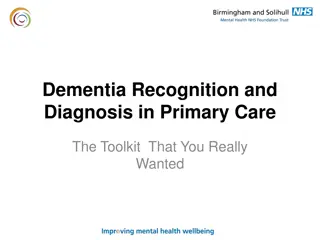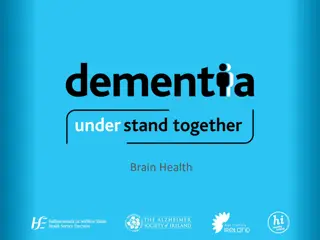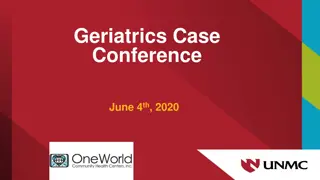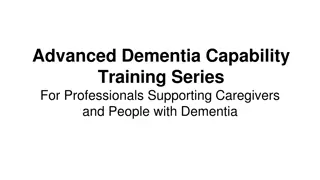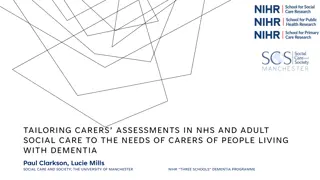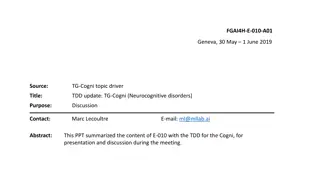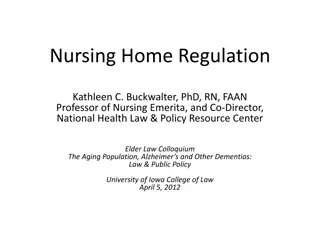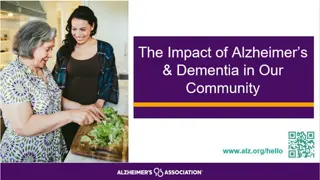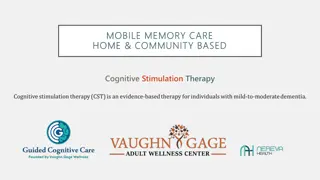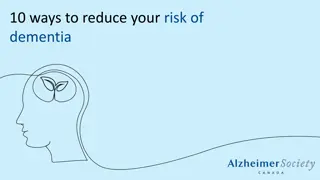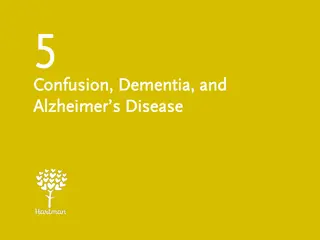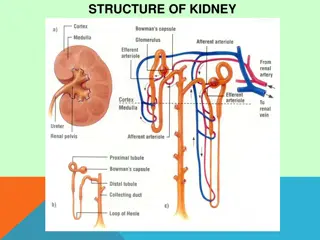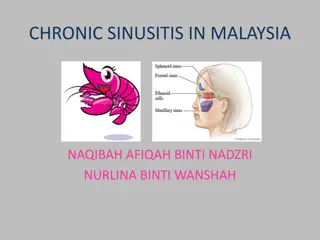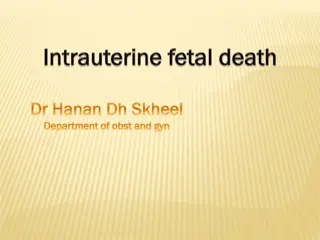Understanding Dementia: Causes, Symptoms, and Management Overview
Dementia is a clinical syndrome involving memory, cognitive, and behavioral difficulties leading to impairment in daily activities. This session covers diagnosis, risk factors, types of dementia, case studies, management strategies, and the impact of dementia on driving. Learn about the stages, incidence, and modifiable/non-modifiable risk factors associated with dementia.
Download Presentation

Please find below an Image/Link to download the presentation.
The content on the website is provided AS IS for your information and personal use only. It may not be sold, licensed, or shared on other websites without obtaining consent from the author. Download presentation by click this link. If you encounter any issues during the download, it is possible that the publisher has removed the file from their server.
E N D
Presentation Transcript
VIDEOS The bookcase analogy https://www.youtube.com/watch?v=kkvyGrOEIfA Pathophysiology/causes/symptoms https://www.youtube.com/watch?v=v5gdH_Hydes
DEMENTIA Dr Uma Narayanan
WHAT WOULD YOU LIKE TO LEARN IN THIS SESSION?
OVERVIEW OF THE SESSION Diagnosis Risk factors Types of dementia Case studies Management What s new Dementia and driving: role plays
WHAT IS DEMENTIA? Dementia describes a clinical syndrome that encompasses difficulties in memory, language cognitive processing and behaviour that leads to impairment in activities of daily living (BMJ2015;350;h029)
PROBLEMS Decline in memory Decline in other cognitive functions affecting ADL Challenging behaviour
STAGES OF DEMENTIA Middle stage (MMSE 20 or <) Memory worsens, difficulties with Activities of Daily Living (ADL), Behavioural & Psychological Symptoms in Dementia (BPSD), communication problems, safety risks Diagnosis and early stage Loss of memory, poor judgement, confusion, personality/behavioural changes Late stage Frailty, immobility, swallowing problems, malnutrition, recurrent infections
INCIDENCE 5% people over 65 are affected 20% of people over 80 Prevalence expected to double by 2040 Estimated 50% undiagnosed Contributes 1 in 4 hospital admissions Health and social cost more than stroke, heart disease and cancer combined Only 50% of people affected are diagnosed!
RISK FACTORS Modifiable risk Non-modifiable risk Alcohol Smoking (AD) Obesity Hypertension Head injury Educational stimulation Age Learning disability Sex
TYPES OF DEMENTIA Alzheimer s Disease (60%) Vascular Dementia Mixed (AD + Vascular) Parkinson s Disease Dementia Pick s Disease (frontotemporal dementia) Dementia with Lewy bodies
WHEN TO SUSPECT Family concerned and patient denies any memory problem Head turning sign
DIAGNOSIS OF DEMENTIA National Dementia Strategy encourages early diagnosis Dementia does not fulfil criteria for population screening Case finding in high-risk groups, which are... >60 with CVD, DM, COPD, obesity, alcohol, smoking >40 with Down s syndrome >50 with learning disability Patients with neurodegenerative diseases Any patient who presents with memory loss Dementia Enhanced Service 2015/2016
DIAGNOSIS Primary Care -History (Carer assessment) -Examination (Cognitive Assessment) -Blood screen Referral to Old Age Psychiatry -Neuropsychological testing -Imaging (MRI, CT) -Sub-type differentiation
ASSESSMENT TOOLS MMSE (Gold Standard, 8mins) 6 CIT (for GPs, 90% sensitive, 100% specific, 3-4mins) GP-COG (for GPs, 4mins) www.patient.co.uk (e-copy/printable)
GP-COG Takes less than 4 minutes Multicultural population. Freely available 85% sensitive and 86% specific. Score <4 indicates cognitive impairment and 5-6- indeterminate needing informant questionnaire.
GP-COG (BRODALY ET AL. JAGS 2002; 50:530-534) Name and address: for subsequent recall test Time/Orientation: what is the date? Clock Drawing mark in numbers; mark hands to show 11:10 Information: Can you tell me something that has happened in the news recently? Recall: What was the name and address I asked you to remember?
REFERRAL TO MEMORY CLINIC Prepare the ground Ideas, concerns... What do you think this might be? Discuss possible diagnosis, exploring the D word. Highlight complexity of diagnostic process.
CASE STUDIES History Investigations and why you are doing them Examination
CASE 1 A 72 year old man presents in the GP surgery with his daughter. She says that he is getting forgetful and on occasions has phoned her in the middle of the night asking her when she is coming to take him shopping. He was widowed 5 years previously and is a retired policeman. She says that she is worried that he may be developing Alzheimer s.
CASE 2 An 80 year old lady attends the surgery with her daughter. You have seen her previously at home when you attended her husband with a chest infection. The daughter says that she has lost weight and isn t eating. She has also been found by neighbours wandering in the street on one occasion and seemed disorientated. The lady herself has no recollection of that event and denies that there is a problem with her eating. She says she feels fine and doesn t want anyone making a fuss after all, everyone forgets things as they get older, don t they?
CASE 3 A 62 year old man who works in a call centre presents to the GP surgery on his own. He says that he is forgetting things and that it is making it difficult to do his job. He has had to write down his computer password (against company policy) as he cannot remember it and has on occasions had to ask his supervisor to help him to log on at the beginning of a shift. He feels down and very worried about it as his brother who is 10 years older developed Alzheimer s disease at about the same age and this was preceded in his brother by a bout of depression. The patient has suffered with depression about one year ago.
EARLY DIAGNOSIS Benefits Disadvantages
BENEFITS: Relief; End to uncertainty; Label for symptoms; Better understanding; Focus on positive; Cognitive and coping skills training; Drug treatments; Psychosocial support; Family support; Autonomy; Advanced planning and financial planning
DISADVANTAGES: Distress; Depression; Social isolation; Lack of cure; Stigma; Wrong diagnosis; Negative effect on function; Invalid role
EARLY DIAGNOSIS( BMJ 2013) Evidence suggests most people prefer to know! Advance care planning can reduce inappropriate hospital admissions towards end of life.
DEMENTIA POST DIAGNOSTIC SUPPORT( 2013- ALZHEIMERS SOCIETY) 40% lost friends 48% said they were a burden to family. 19% burden to friends 61% felt lonely 77% felt anxious/ depressed.
DEMENTIACAREPLAN POST DIAGNOSTIC SUPPORT(DES) General physical, mental and social review. Medication review/ side effects of medications. Advance care planning and DNAR Communication and co-ordinating arrangements for future. Identifying carers/ consent to share information.
DEMENTIA - CARE PLAN (DES) Post diagnostic support - Review understanding of diagnosis and provide written information - Information Alzheimer s Society, local memory cafe - Practical support: cognitive training/rehabilitation - Psychological therapy: difficulty adjusting to diagnosis -Discuss medico-legal issues eg. Driving -Information regarding financial and legal advice
CARERSUPPORT (BMJ 2011) Carers of People with Dementia: higher burden More mental health problems Worse physical health Living bereavement NDS: Implement carers strategy Assess main carer s needs as well as patient Educational resources for carers www.carersuk.org NICE suggesting health checks for dementia carers for QOF 2014/2015
TREATMENT Cognitive symptoms BPSD Pharmacological (NICE) Cholinesterase inhibitors Memantine Non-pharmacological Cognitive stimulation therapy (NICE) Environmental interventions Clinical interventions
TREATMENT (CONTD.) DTB 2014: currently no intervention that cures or alters long-term progression of dementia All drugs have modest efficacy in treating cognitive function/ADL/behaviour NNT= 12 NNH=12 No evidence that one drug is more effective than others
TREATMENT (CONTD.) Acetyl cholinesterase inhibitors (for mild- moderate AD): Donepezil Galantamine Rivastigmine Memantine (for moderate-severe AD) Combination of treatments have shown conflicting results Rivastigmine has shown modest benefits in Lewy Body, Parkinson s and Vascular dementia (unlicensed) No benefit in MCI
MANAGEMENTOF BEHAVIOURAL & PSYCHOLOGICAL SYMPTOMS IN DEMENTIA (BPSD)
BPSD Behavioural restlessness physical aggression screaming, agitation wandering sexual disinhibition shadowing
BPSD Psychological anxiety depressed mood delusions hallucinations BPSD occurs in up to 90% people with dementia
BPSD More common as dementia progresses Approach should be broad, biopsychosocial approach. May need to try several management options Most cases are self limiting. So, non-pharmacological/ short term pharmacological approach is safe and effective.
MANAGEMENTOF BPSD Non- Contributory Factors Pharmacological treatment pharmacological treatment
CONTRIBUTORY FACTORS Physical (infection, pain, constipation) Activity-related (washing, dressing) Iatrogenic (drug side-effects) Noise (loud environment) Exclude delirium
NON-PHARMACOLOGICAL TREATMENT Environment Safe environment for wandering Calm Pets Behaviour therapy Reminiscence therapy Music therapy Train staff
PHARMACOLOGICALTREATMENTS SSRI drugs reduce agitation Sertraline Citalopram Trazodone Mirtazapine (second line drug) Anti-convulsants Carbamazapine Gabapentine Lamotrigine Topiramate Avoid benzos and long-term sedating anti- histamine
PHARMACOLOGICALTREATMENTS (CONTD.) Anti-psychotics in BPSD: CSM warning to AVOID PRESCRIBING Increase risk of stroke Increase mortality NEVERIN LEWY BODY/PARKINSON S Low dose risperidone only licensed option for short-term use for severe psychosis, agitation and aggression in moderate-severe AD
WHATS NEW? New drug: latrepirdine (Dimebon?) Dementia-DES MCI (Mild Cognitive Impairment) Vitamin B and mild cognitive impairment (VITA Cog) Anti psychotics in dementia (BMJ 2012) Analgesia in BPSD (DTB summary) Anti depressants in Alzheimers (Lancet 2011) Move from secondary to primary care
MCI Impaired memory for age and education but with preservation of general cognitive function Increased risk of developing dementia (5-10%) 25-30% recover/improve No evidence that drugs reduce progression Cognitive stimulation effective at delaying progression VITACOG study: Vitamin B (folic acid, B12 and B6) Improves memory scores
INFORMATIONPROVISION Alzheimer s Society www.alzheimers.org.uk
ENHANCEKNOWLEDGE DH/RCGP e-learning for Health Care of older people 2 dementia modules www.e-lfh.org.uk/projects/egp
DEMENTIA FRIENDS Alzheimer s Society programme Changing public perception of dementia Learning about what it is like to live with dementia Turning that understanding into action Can then volunteer to be a Champion and encourage others to learn more about dementia
OTHER BITS Advanced decisions Advanced statements LPA Driving and Demntia Mental capacity
ADVANCED DECISIONS One aspect of planning ahead Gives opportunity to make decisions about specific treatments that the patient may or may not want to receive in the future e.g. Can refuse life-sustaining treatments or blood transfusions An advanced decision is legally binding Need to fulfil certain requirements Should be valid and applicable
